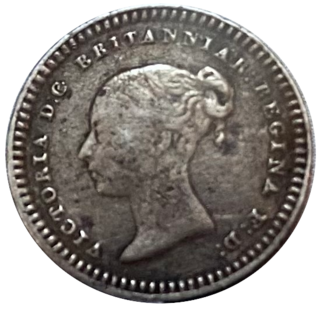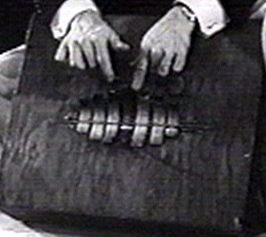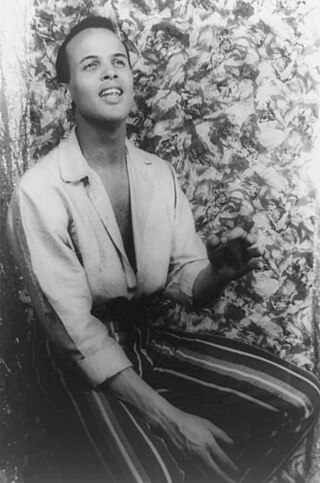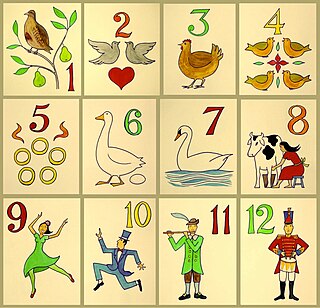Related Research Articles

Toasting or deejaying is the act of talking, usually in a monotone melody, over a rhythm or beat by a deejay. It can either be improvised or pre-written. Toasting developed in Jamaica, before it took up that name and being part of the sound system era, a similar sound of it is found in mento and now can be heard over musical styles including ska, reggae, dancehall, dub, grime, hip hop, soca and bouyon music. The combination of singing and toasting is known as singjaying.
The music of Jamaica includes Jamaican folk music and many popular genres, such as mento, ska, rocksteady, reggae, dub music, dancehall, reggae fusion and related styles.

The British three halfpence coin was a denomination of sterling coinage worth 1/160 of one pound or 1/8 of one shilling. It was produced for circulation in the British colonies, mainly in Ceylon and the West Indies in each year between 1834 and 1843, and also in 1860 and 1862. Proof coins were also produced in 1870.
Mento is a style of Jamaican folk music that predates and has greatly influenced ska and reggae music. It is a fusion of African rhythmic elements and European elements, which reached peak popularity in the 1940s and 1950s. Mento typically features acoustic instruments, such as acoustic guitar, banjo, hand drums, and the rhumba box — a large mbira in the shape of a box that can be sat on while played. The rhumba box carries the bass part of the music.

The marímbula is a plucked box musical instrument of the Caribbean. In Cuba it is common in the changüí genre, as well as old styles of son. In Mexico, where it is known as marimbol is played in son jarocho; in the Dominican Republic, where it is known as marimba, it is played in merengue típico, and in Jamaica it is known as rumba box and played in mento.
Parody music, or musical parody, involves changing or copying existing musical ideas, and/or lyrics, or copying the particular style of a composer or performer, or even a general style of music.

"Day-O " is a traditional Jamaican folk song. The song has mento influences, but it is commonly classified as an example of the better known calypso music.
"Funiculì, Funiculà" is a Neapolitan song composed in 1880 by Luigi Denza to lyrics by Peppino Turco. It was written to commemorate the opening of the first funicular railway on Mount Vesuvius. It was presented by Turco and Denza at the Piedigrotta festival the same year. The sheet music was published by Ricordi and sold over a million copies within a year. Since its publication, it has been widely adapted and recorded.
"Linstead Market" is a Jamaican folk song of the mento type that tells of a mother who goes to the market with her ackee fruit but does not sell any, with the result that her children will go hungry.

Lucy Etheldred Broadwood was an English folksong collector and researcher, and great-granddaughter of John Broadwood, founder of the piano manufacturers Broadwood and Sons. As one of the founder members of the Folk-Song Society and Editor of the Folk-Song Journal, she was one of the main influences of the British folk revival of that period. She was an accomplished singer, composer, piano accompanist, and amateur poet. She was much sought after as a song and choral singing adjudicator at music festivals throughout England, and was also one of the four main organisers of the Leith Hill Music Festival in Surrey from its commencement in 1904 until her death in 1929.

"The Twelve Days of Christmas" is an English Christmas carol. A classic example of a cumulative song, the lyrics detail a series of increasingly numerous gifts given to the speaker by their "true love" on each of the twelve days of Christmas. The carol, whose words were first published in England in the late eighteenth century, has a Roud Folk Song Index number of 68. A large number of different melodies have been associated with the song, of which the best known is derived from a 1909 arrangement of a traditional folk melody by English composer Frederic Austin.
The Ash Grove is a traditional Welsh folk song whose melody has been set to numerous sets of lyrics. The best-known English lyrics were written by Thomas Oliphant in the 19th century.
"Choucoune" is a 19th-century Haitian song composed by Michel Mauléart Monton with lyrics from a poem by Oswald Durand. It was rewritten with English lyrics in the 20th century as "Yellow Bird". Exotica musician Arthur Lyman made the song a hit in 1961.
Olive Lewin OD OM was a Jamaican author, social anthropologist, musicologist, and teacher. She is best known for her recorded anthologies of old Jamaica folk songs, researched and collected over her lifetime.
Walter Jekyll, was an English clergyman who renounced his religion and became a planter in Jamaica, where he collected and published songs and stories from the local African-Caribbean community.

Alice Werner CBE was a writer, poet and teacher of the Bantu languages.
Augustus "Lord" Messam was a Jamaican mento singer who performed throughout the 1950s up until the mid 1960s. With his band, Messam released several records that consisted of a mixture of original and traditional material on the Stanley Motta record label, under the name Lord Messam & His Calypsonians.
"River Bank", also "River bank Coverly" and "River Bank Coberley", is a traditional Jamaican song. The song is an old Jamaican mento standard. It has been adapted both by Reggae musicians, and also by jazz musicians, such as trumpeter Baba Brooks who reworked "River Bank" into "Bank to Bank".
Songs of Jamaica is the first book published by the African-Jamaican writer Claude McKay, which appeared in January 1912. The Institute of Jamaica awarded McKay the Silver Musgrave Medal for this book and a second volume, Constab Blues, also published in 1912. He used the associated stipend to fund a trip to the United States of America.
References
- Leroy M. Backus III, "An Annotated Bibliography of Selected Sources on Jamaican Music," The Black Perspective in Music, vol. 8, no. 1 (Spring 1980), pages 35–53.
- Walter Jekyll, Jamaican song and story: Annancy stories, digging sings, ring tunes, and dancing tunes, London: David Nutt, 1907. Reprinted by Dover Publications, ISBN 9780486437200 (pbk), 2005.
- Olive Lewin, Forty Folk Songs of Jamaica, General Secretariat of the Organization of American States, Washington, D. C., 1973.
- Olive Lewin, Rock It Come Over: the Folk Music of Jamaica, Kingston: University of the West Indies Press, 2000.
- Anand Prahlad, "Jamaica: Musical Traditions," in The Greenwood Encyclopedia of African-American Folklore, Westport, Connecticut: Greenwood Press, 2006, pages 685–687.
- Helen H. Roberts, "Possible Survivals of African Song in Jamaica," The Musical Quarterly, vol. 12, no. 3 (July 1926), 340–358.